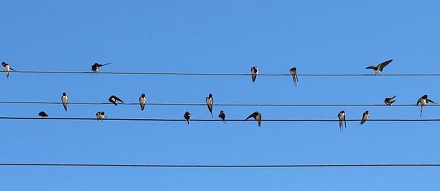Living Planet
Nature · Earth · ClimateNature Notes: September 2022
BIRDS OF A FEATHER
Nothing signals the first call of Autumn to me more than the excited 'cackle and caw' of large numbers of black crows as they gather to glean the spilt seed on a misty morning in our golden harvested fields. Then, later, flocks of swallows that perch on our telegraph wires, and other swirls of gathering migratory birds who are preparing to leave our shores for their perilous journeys to countries thousands of miles away. This year, I was also keeping my eyes peeled for any of the 37 young storks released at Knepp in mid August, as the White Stork Project were asking the general public to report any sightings before they were ready to fly southwards.
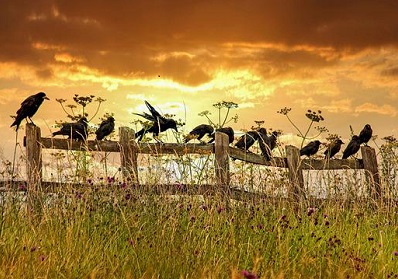
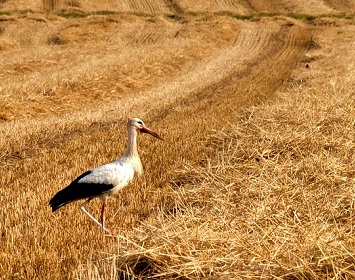
Having just experienced our second heatwave of the summer I hope our resident wildlife can find enough food to survive currently, let alone store any for the coming winter. As I write the rumble of thunder signifies the first rains to have arrived in months, which carry the wonderfully sweet smell of petrichor over parched fields. Whilst major rivers all around Europe have been reduced to a trickle, some of our own village streams had run dry by the start of August, slowly diminishing into ever decreasing air bubbling puddles, suffocating all fish, eels and aquatic life within. Around their banks we also lost birds and ground-feeding mammals suffering from overheating and dehydration as they failed to find enough water or food. I came across several dead bumble bees in the garden who are unable to forage in very high temperatures because of their furry coats. Our fields have lain dry and bare, farmers already unloading winter feed - straw-coloured sileage and hay onto straw-coloured grass, for panting animals. The UK is also currently experiencing the largest outbreak of highly pathogenic avian influenza on record with both poultry and wild birds affected. As the 'shoots' in and around Slinfold and elsewhere currently take delivery of thousands of imported pheasant chicks, to be fattened up before being blasted from our skies at the start of October, the RSPB are calling on the Government to halt the annual release of the c 57 million gamebirds due to be released into our countryside to prevent the spread of avian flu through all of our wild bird populations.
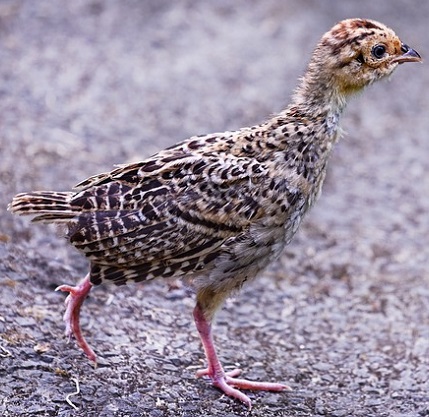
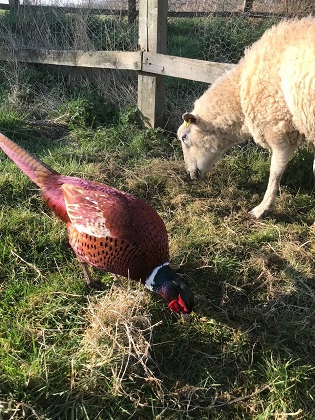
With our planet at a breaking point the Pope, has used this time in the church calendar, known as 'The Season of Creation' - to call for decisive action "On the one hand, we can hear a sweet song in praise of our beloved Creator, ringing from a grandiose cosmic choir composed of countless creatures", he said, "And on the other, an anguished plea, lamenting our mistreatment of this our common home." He's right. Our night skies throughout August and the last supermoon of the year were truly awe-inspiring and creation does sing to us in different voices - visual, verbal and audible. How lucky we are to live in a village where we can still hear some of the re-assuring sounds of nature, the sweet songs of our garden birds, the bark of a deer carried from the hills, the soft rustle of wind in the trees, whilst we also bear witness to the loss and damage of our wildlife and the home in which we live such as the notable silence of our crickets and our once fresh, bubbling streams. We've also seen the golden tinges of sun-scorched bracken, the burnished leaves already falling from our drought-stricken trees and the plants that have shrivelled and died - known as 'false Autumn'. But September is also traditionally 'harvest festival' a time for giving thanks for God's creation and celebrating the abundance from our hedgerows, gardens and fields, even if the blackberries are a bit tight and tart this year. The yields may be down and our livestock thin, but nature is ever giving and providing and we've such a lot to be thankful for.
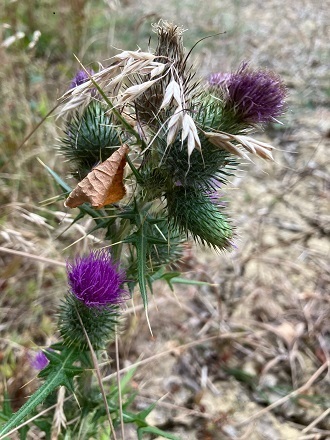
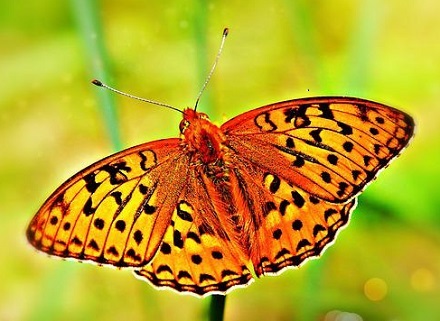
One 'apparent' sunset coloured leaf caught on the breeze, turned out to be a large and graceful Silver-washed fritillary (actually golden in colour) whilst another triangular shape, I thought was the closed wing of a Comma supping from a deep purple thistle flower, turned out to be a curled bronze leaf caught by its spikes. The thistles now bear tufts of shedding white hair, released in chunks across the harvested fields, gleaming in the dawn sunlight as if nature has been enjoying a huge pillow fight in the middle of the night.
I spotted a pied fly-catcher in mid-August, on its perch at the end of the branch of an oak - where it was waiting to snatch flying insects from the air and I wondered how long it would have to wait? Oaks are said to be host to around 280 different species of insects and we're lucky to have so many sturdy trees in and around the village, still clutching onto life and summer with their far-reaching canopies of fanning leaves that have been providing much needed shade and cool for all sorts of birds, mammals and farm animals. By mid-August, when warm winds led to the early shedding of many of their small, unripe green acorns, the raucous chatter of large flocks of corvids gathering could be heard at dawn and dusk. I was often woken by jackdaws busily picking the moss off my tiles and out of my gutters in their own search for insects - tossing chunks of what looked like large, stale/burnt chocolate cake onto my otherwise blonde bleached lawn. However, one more serious hand sized bullet resembling stale lemon cake has turned out, more worryingly, to be a chunk of cement that had been securing my chimney pot!!
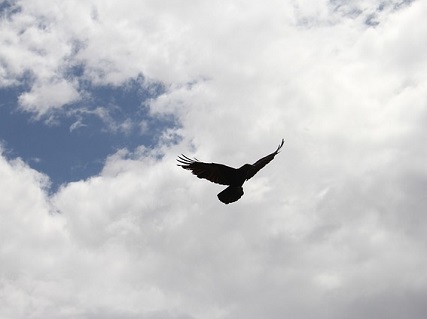
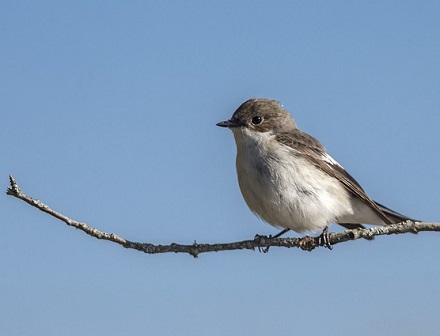
According to experts, jackdaw, rook and crow communal roosts aren't just places to assemble in the Autumn and Winter for warmth and protection, but are also highly sociable 'information centres', where they learn new behaviours and share knowledge about all sorts of things, such as the people and the places to avoid and the best sources of food and drink. There have been other corvid calls on the Slinfold section of the Literary trail. If you've heard a "Croooaaak", "cr-r-ruck", "tok", or "wonk-wonk" then it's likely to have come from a pair of ravens who have made their home at the top of a dead tree near one of our streams - these are just a few of their 20 or so distinct calls which they use to communicate a range of emotions. This pair were both seen last in mid- August escorting a heron out of 'their territory' like a pair of fighter 'planes on either side. If you're lucky you may see them somersault in flight and even fly upside down! They also soar more than crows - look for their diamond shaped tails which also help distinguish them, as well as overall size, head shape and the afore-mentioned, deeper calls, compared to the crows more raspy "caw caw caw". Ravens are also less sociable but if and when do they do gather together for the winter, they're often known collectively as a "rant!"
One particular snack that crows are partial to - are tiny harvest mice. I came across a nest near Theale, in the form of an exquisite ball of 'suspended' grass about a foot off the ground that was actually woven on a stalk. Most harvest mice litters are born, blind and hairless, in August. By now they'll be growing quickly, exploring the outside and learning to use their tail as a 'prehensile limb' to give them greater agility. I've rarely seen the mice themselves in the wild. These beautiful little creatures (only 5cm long) have really acute hearing - they'll either freeze or drop into cover in response to rustling sounds up to 7m away!
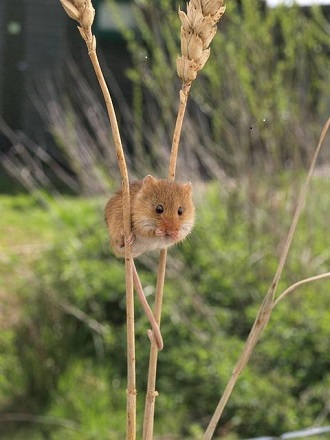
Birds are very connected to their environment and the climate has had a long history in shaping their behaviour, such as how, where and when they live, mate, breed and migrate. There's also a lesson for us in their strength and unity when they flock together and are able to change their patterns according to their mission. But their fragile interconnectedness shouldn't be taken for granted and neither should ours. May we all be sensitive to every living thing with which we're connected in this web of life. Fly high, be happy as a lark and don't forget to look out for others and gather them under your own wings, this new season of new beginnings ...
